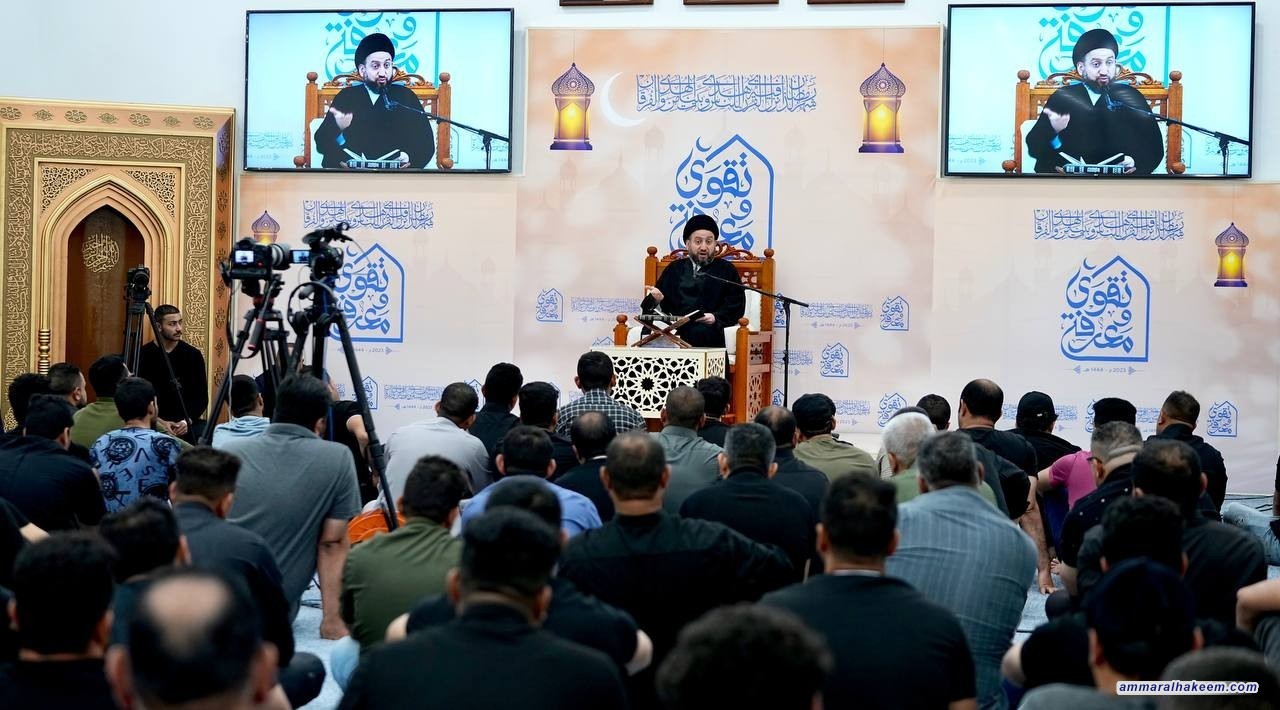Sayyid Al-Hakeem, limits philosophy, deterrence, not retaliation
In the 10th Ramadan lecture on 9/4/2023, Sayyid Ammar Al-Hakeem, head of Al-Hikma National Movement, continued his speech on the letter of rights to our Imam Zayn Al-Abidine Ali bin Al-Hussein “PBUT” and went on the right of hand and its implication including thievery, indicating that the philosophy of ultimate punishment is deterrence, not retaliation and imposing suffering. According to the narratives, the location of cutting a hand must be at the beginning of the fingers, indicating that the conditions are crippling to avoid imposing the ultimate punishment as much as possible, detailing the requirements of imposing punishment:
- Adulthood.
- Sanity.
- Selection.
- In no need to steal.
- The value of the stolen shall be one-quarter dinars of pure minted gold.
- The money is in possession or hidden.
- There is no ultimate punishment for the theft of food in the years of scarcity.
More conditions are:
- The thief had taken out the money and not just seen it.
- The thief breaks the lock.
- The thief should not be a father who stole from his son's money.
- The theft should be hidden.
- The stolen is owned by a specific person.
- The thief shall twice acknowledge his theft or be proven to be guilty with the testimony of two fair witnesses.
- The moment of taking the decision shall be the moment of consciousness (mind) with the availability of choice and shall not be made by pressure and coercion, and taking a decision with the intention of thievery.
- The theft shall not have judgment suspicion, and the theft shall not have objective suspicion. (Meaning that the judgment of thievery and its objective is under suspicion)
- The thief took the money with the intent of theft.
- The owner of the money shall not have entrusted it to that person.
- Not to be as a compensation for debt from the victim.
- The thief does not claim the owner's permission to take the money.
- The stolen money is not public property.
- That money is not spoils of war in which the thief participated.
H.E. indicated that one of the conditions of the ultimate punishment is for the hand to contain fingers which weren’t taken for a different reason, the owner asks for the ultimate punishment and doesn’t back down after affirming it twice. There is no ultimate punishment for those who plead before judgment or revelation of truth, or if the thief has attempted multiple robberies before punishment and the truth came at once. There is also no ultimate punishment if the hand will lead to death if cut.


/9/3/photo_2025-12-10_09-25-13.jpg)
/9/2/photo_2025-12-10_09-17-58.jpg)
/9/1/photo_2025-12-10_09-11-13.jpg)
/8/3/photo_2025-12-09_10-42-49.jpg)
/8/2/photo_2025-12-09_10-37-31.jpg)
/8/1/photo_2025-12-09_09-54-18.jpg)
/7/1/photo_2025-12-08_09-38-41.jpg)
/5/1/photo_2025-12-07_09-25-35.jpg)
/3/2/photo_2025-12-04_11-05-55.jpg)
/3/1/photo_2025-12-03_11-49-28.jpg)